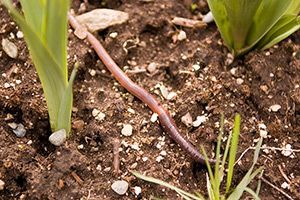How Earthworms Help Your Garden

Dear “green thumb enthusiasts”, earthworms can be one of your best friends in your gardening arsenal of tricks. Your flower/fruit/vegetable gardens will benefit from the friendly earthworm in a variety of different ways and are commonly found in all types of soil.
The goal of any gardener should be to try and accumulate as many Earthworms inside their garden as possible to achieve a healthy, nutrient-filled garden oasis.
Why are earthworms so awesome? Earthworms create tunnels underneath the soil of your garden, breaking up the soil and allowing pathways for air and water to reach the roots of plants. Earthworms can burrow as deep as 6 ft. underneath soil which prevents it from getting too dry and compact during droughts.
Another reason earthworms do so well in gardens is because their waste is called “castings” and it helps the growth of gardens due to its richness of phosphorus, calcium, nitrogen, and magnesium. Each one of these nutrients is essential to grow and maintain a healthy garden throughout peak growing seasons.
These slimy, garden experts don’t just help your garden grow: they also eat harmful organic materials such as dead leaves and grass, rotting plants, and animal manure, which is then digested and released in the form of castings. Earthworms produce their weight in castings every day, producing nutrients that would not be available without their presence.
There are things you can do to your garden to help grow the number of helpful earthworms underneath your soil. Layering your garden with mulched leaves or grass clippings will draw more earthworms to the soil and will provide the earthworms with more organic material to eat and then recycle. What a great, natural way to provide your plants and flowers with the quality soil they need to thrive!
Earthworms are a key element to a successful garden and will help yield more delicious fruits and vegetables every season. Fill your plates with tomatoes, peppers, green beans, lettuce, and other nutrient filled veggies by always keeping your small, slippery, “garden helpers” happy!


